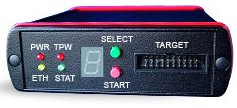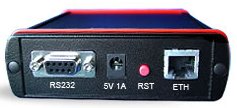Debug tool adds PowerPC, AVR32 support
Jun 30, 2009 — by Eric Brown — from the LinuxDevices Archive — 10 viewsRonetix announced the availability of new firmware for its Linux-friendly JTAG/BDM emulator and flash programmer. The “PEEDI” JTAG/BDM Emulator and Flash Programmer now supports the PowerPC-based Freescale MPC5200 “telematics” processor, as well as the general-purpose, low-power Atmel AVR32 family of processors, says the vendor.
In December, Ronetix announced PEEDI ("powerful embedded Ethernet debugging interface") support for another Freescale PowerPC processor, the PowerQUICC II Pro MPC83XX. The Austrian firm had previously supported Freescale Nexus-enabled PowerPC and ColdFire processors. Other supported processors include a range of ARM Cortex-A8, ARM11, ARM7, ARM9, XScale, ADI Blackfin, and most recently, MIPS32 processors.
The PEEDI's built-in "Flash Programmer" supports programming of over 900 NOR flash devices and 8-bit and 16-bit NAND flash devices connected to a CPU via the JTAG interface, says Ronetix. Because PEEDI supports several flash profiles, developers can program a complete Linux system at once, including U-Boot, the Linux kernel, and the JFFS2 root filesystem, says the company. Ronetix adds that with its built-in GNU gdb support, PEEDI can be used with any GNU gdb-based debugger, including Insight or Eclipse, without the need for additional software.


Ronetix Peedi
Announced by Motorola in 2003 before Freescale had spun off as a separate company, the MPC5200 is based on a 400MHz PowerPC 603e core (with Floating Point Unit) performing at 760 MIPS (million instruction per second). The processor is said to consume less than 850 milliwatts of power, and includes a ROM/RAM/flash memory controller along with a long list of on-chip interfaces.
The MPC5200 was designed for gateways, industrial controllers, instrumentation, image processing, and automative telematics. It is in the latter category where the chip appears to have taken off. In 2004, for example, Metroworks (later acquired by Freescale) released an "Automotive Grade Linux" (AGL) BSP (board support package) for the processor.
Atmel AVR32
Atmel launched its AVR32 family of processors in 2006 starting with its AT32AP7000 system-on-chip (SoC). Aimed at a wide range of devices, including mobile devices, set-top boxes, networking equipment, and home entertainment systems, the chip was designed to perform well at low clock speeds, consuming minimal power. In large part, this is due to its support for super-efficient, "DSP-like" instructions, and highly dense 16-bit code, in addition to extended 32-bit code.
Atmel initially supplied its STK1000 board with a 2.6-series Linux kernel, and a choice of commercial or GNU compilers. However, it wasn't until 2007 that the open source T2 SDE project offered the first real Linux distribution support for the chip. The support package included cross-platform build tools claimed capable of bootstrapping cross toolchains, thus simplifying ports to new architectures.
Availability
PEEDI firmware for Freescale MPC5200 and Atmel AVR32 processors is available now, says Ronetix. More information on the PEEDI may be found here.
This article was originally published on LinuxDevices.com and has been donated to the open source community by QuinStreet Inc. Please visit LinuxToday.com for up-to-date news and articles about Linux and open source.